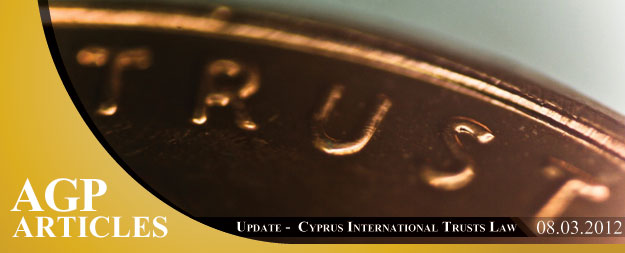
Recommended contact person
After the world’s financial crisis and the new international control and security measures placed by governments on international business transactions and disclosure of information, the use of Trusts as a Special Purpose Vehicle (SPV) for international tax planning and business structuring is now constantly being increased and evolving even further.
Trusts have been created for many reasons, in an effort to reduce tax liabilities, to manage the distribution of assets on death; to avoid inheritance regulations; to avoid publicity of probate; to protect assets from potential creditors etc.
The Cyprus International Trust was first introduced in 1992 and placed Cyprus in the world’s most attractive trust jurisdictions. However, as the world has changed during the last 20 years, and more specifically during the last 4 years, new regulations, investment practices and market evolvements have been introduced making it necessary for the Cyprus International Trust Law to be reformed and be updated in order to follow the today’s business trends.
On 8th March 2012 the Cyprus’ House of Representatives passed a number of amendments to the Cyprus International Trusts Law, updating the law in accordance with today’s business needs as well as in compliance with EU law and directives, placing Cyprus once again on the same playing field with the world’s most attractive trust jurisdictions. In our understanding Cyprus International Trusts Law is now probably considered to be the best Trust Law in the EU.
In this article we will, in summary, outline 8 major amendments to the Cyprus International Law:
1. The place of residency of the Settlor and the Beneficiary
Prior to the 2012 amendments, the use of Cyprus International Trusts was restricted to persons non-Cyprus-residents (settlors and beneficiaries) and for assets situated outside Cyprus, in order to succeed tax avoidance in Cyprus. It was not clear whether such settlors could later relocate to Cyprus after establishing a Cyprus international trust, making it therefore a reason to discourage many individuals from setting up a Trust. The 2012 amendments have removed such residency restrictions with one only condition, that the settlor (ie the client) may not be a Cyprus tax resident in the calendar year proceeding the year of creation of the trust.
The amendments have therefore removed difficulties that might have in the past arisen in case the settlor or any beneficiary was subsequently to take up residence in Cyprus. The term “beneficiary” is now defined to include unborn beneficiaries as well.
2. Investing in Cyprus movable or immovable property
Trustees are now expressly enabled to invest in movable and immovable property in Cyprus and abroad, including shares in Cyprus companies.
3. Validity of an international trust and exclusion of foreign law
Cyprus law has exclusive jurisdiction on the Cyprus International trusts. The new provisions further reinforce the already formidable asset protection features of the Cyprus international trust.
The law as amended explicitly provides that:
- any question relating to the validity or administration of an international trust or a disposition to an international trust will be determined by the laws of Cyprus, without reference to the law of any other jurisdiction;
- the law relating to inheritance or succession in force in Cyprus, or any other country, will not in any way affect the validity of the international trust or any transfer or disposition of property to it;
- the trustees’ fiduciary powers and duties, and the powers and duties of any protectors of the trusts, are governed exclusively by Cyprus law; and
- dispositions to a trust may not be challenged on the grounds that they are inconsistent with the laws of another jurisdiction – for example, regarding family and succession issues- or on the grounds that the other jurisdiction does not recognize the concept of trusts.
4. Setlor’s right to reserve powers and interests
A new section has now been introduced enabling the settlor of a trust to reserve powers to himself or herself, to retain rights over, or interest in, the trust property and to act as a protector or enforcer of the trust without these affecting the validity of the trust.
Such reserved powers give settlors great flexibility and include:
- the right to revoke, vary or amend the terms of the trust;
- the right to apply trust income or capital or to give directions to this effect;
- the right to act as a director or officer or to give binding directions for the appointment or removal of directors or officers of a company belonging to a trust;
- the right to give binding directions to the Trustee in connection with the trust property;
- the right to appoint or remove any trustee, enforcer, protector or beneficiary, investment manager or investment consultant;
- the right to change the governing law or forum of administration of the trust;
- the right to limit the powers of the trustees by stipulating that these are exercisable only with the consent of the settlor or any other person so specifies in the terms of the trust.
5. Duration of the Trusts – Abolition of restrictions
The 1992 law restricted the maximum life of international trusts to 100 years from the date on which the trust came into existence. Only charitable trusts and non- charitable purpose trusts were allowed to exist in perpetuity.
By virtue of the amended law, trusts that are created from the effective date of the amendment onwards, and subject to the terms of the trust, shall not be subject to a maximum duration and therefore are valid indefinitely.
6. Authorized investments – Extension of trustees’ investment powers
Prior to the current amendments of the law, the trustees had freedom in terms of investment powers, merely requiring that such powers be exercised in accordance with the trust instrument and with the diligence and prudence that a reasonable person would be expected to exercise when he or she makes investments.
The newly amended law gives trustees the same investment powers as those of an absolute owner, allowing them to invest in a broader range of investments for the best interests of the beneficiaries. This brings the trustees investment powers into line with those of a trustee in England and Wales, as well as trustees from other trust jurisdictions that have followed the English Trustee Act 2000, including Malta and Jersey.
7. Choice of law clause and public policy
The amending law ensures and guarantees jurisdictional protection of the trust’s legal status by providing that an international trust which contains a choice of law clause in favour of Cyprus law is fully protected from unfounded foreign judicial claims as a matter of “public policy and order”.
8. Taxation
Taxation of Cyprus International Trusts remains most favourable. The new law expressly provides that income and gains of an international trust sourced in or outside Cyprus shall be taxed in Cyprus provided that the beneficiary is a Cyprus tax resident. Furthermore, a non Cyprus tax resident beneficiary shall only be subject to Cyprus tax on Cyprus-sourced income.
In line with the above, a Cyprus International Trust with non-Cyprus resident beneficiaries and income from non-Cyprus sources continues to be exempt from Cyprus.
Comments:
The aforementioned are the major amendments to the Cyprus International Trusts Law. Further amendments have been introduced of more technical issues. It is worth saying though that the Cyprus International Trust is now glorious once again and among the most advantageous trust laws in the world. Surely, prudent consideration between settlor and trustee and advance professional consultation is needed prior to setting up of a Cyprus International Trust so to ensure maximum benefit, security (legal and commercial) and smoothness of the trust management. Persons interested to more information about trusts are welcomed for discussion.
At a nutshell, trusts can be used as:
- Asset protection vehicle
- Inheritance planning
- Tax planning
- Avoiding dissipation of wealth
Please note that this article is only for guidance purposes. For more details please contact our specialized team.
Written By: Angelos G. Paphitis; LLB, LLM, Barrister (UK) Member of the Society of Trust and Estate Practitioners (TEP)















